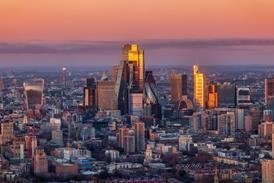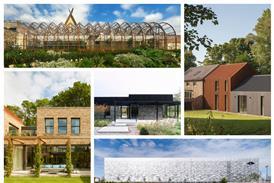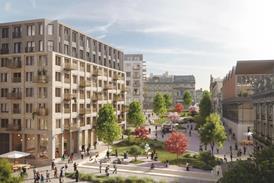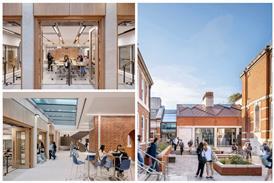Covid-19 is a new experience for us but there are clues all around to previous outbreaks which our forebears endured, writes Eleanor Jolliffe

I was due to begin a column series on the intersection of architecture and politics, but – in light of the current situation – I’ve decided to postpone it. Working from home alone, not sure when I’ll see loved ones again, my enthusiasm for the intricacies of policy making has waned somewhat. What I’ve been finding strangely comforting is the odd article I have seen about the history of pandemics and quarantine. While unprecedented in our lifetimes, humanity has been through this before and has emerged – sometimes limping and depleted – but it has emerged. And sometimes strengthened and refocused.
A little bit of research and I realise what I should have already known: that the health and prosperity of the modern West is almost unknown through history. Access to the wonders of modern medicine have largely curtailed the epidemics that always thrive in places where humans live in close proximity. The UK, and in particular London, has always known waves of death.
The Black Death in 1348 killed 40% of London’s population. Outbreaks of the “sweating sickness” struck London at least six times in the 16th century – in 1528 so severely that it “carried off thousands in the space of five or six hours”. And there were at least five “plague years” between 1563 and 1603.
In much more recent history the Industrial Revolution attracted vast swathes of the population into cities, resulting in numerous deaths from the typhoid and cholera that abounded in the overcrowded streets – and counting Prince Albert among their victims. In 1918 returning soldiers from the First World War assisted in speeding the spread of what was known as the “Spanish Flu” which killed between one and six per cent of the global population.
In more recent times outbreaks of Aids, Ebola, Sars and H1N1 have been little more than tragic headlines for the majority of us, barely touching our daily lives. Modern medicine has not prevented epidemics but it is much more effective at containing them. The current coronavirus lockdowns are all but unprecedented in modern western history.
London’s streetscape still shows signs of its previous battles with disease
We all live surrounded by the impact of epidemics. Some are very visual, such as the ruined village abandoned after the Black Death in a field above the village where I grew up. Others are much less obvious, such as the championing of modern science by the foundation of the Royal Society in 1665 after a particularly bad plague year (recorded in Samuel Pepys’ diaries).
London’s streetscape still shows signs of its previous battles with disease. Look around and you will see odd patches of open land or car parks in closely packed areas of the city – sites that are believed to be plague pits. Even on the buildings themselves – London’s population grew so superstitious through its constant exposure to fear of death and disease that many streets (including Oxford Street, Fleet Street, Park Lane, Praed Street, St James’s Street, Haymarket and Grosvenor Street) do not contain a number 13.
Covent Garden, the first planned (though unfinished) suburb, was conceived by the 4th Earl of Bedford as housing for an elite population away from the crowded streets of the City and the diseases that abounded there. The West End as we know it followed.
Epidemics are even arguably responsible for touring repertories; it was common in Tudor times for the royal court to leave London in the summer to avoid the outbreaks of contagion and sickness brought about by the hot weather. This rural retreat ran the risk of contagion following it, but it also bought culture and entertainment to the rest of the country with musicians and actors following the royal progress. It might be a stretch to imagine that 2020’s (suspended) Abba Mania tour stems directly from Henry VIII’s fear of disease, but the pattern started somewhere.
Indeed even the water running from your kitchen tap is due in some small part to the plague. Social reformers in the 19th century used the constant outbreaks and rapid contagion of sickness in urban populations to lobby government that sanitary reform (piped water and sewage) was not a luxury – and was a civic, rather than a private, problem. This not only brought sanitation to the masses and drastically reduced outbreaks of typhoid and cholera, but led to standardisation of water, gas and electric supply – eventually leading to national health and safety standards and our current building regulations.
I hope the death toll of the current pandemic does not rise further. I hope the worst-case scenarios remain hypotheses in Whitehall files, and I hope the new Nightingale hospitals never fill. I don’t know what world we will emerge into and while others have speculated how it might impact our built environment or way of working I don’t want to prophesy.
However, based on the witness of the past, the refining nature of a pandemic seems likely to better equip us to tackle problems – built and social – that have been “pushed into the long grass”. I hope you all keep well and safe and enjoy the relative comforts and security of home while we wait this out.
















3 Readers' comments